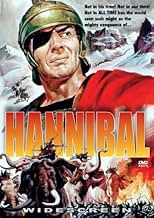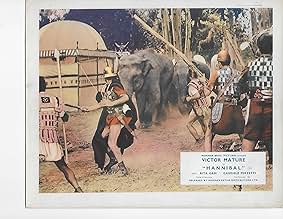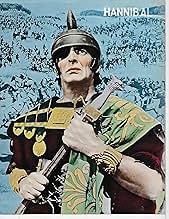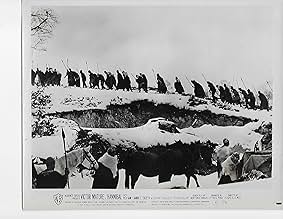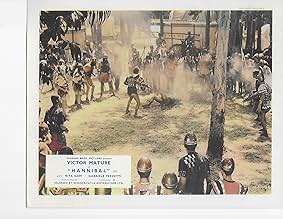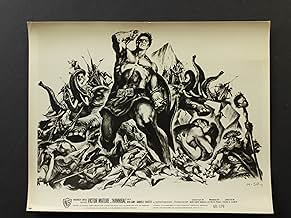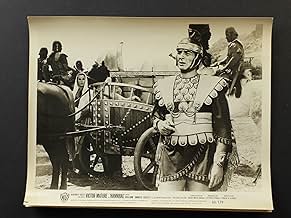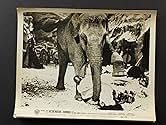IMDb RATING
5.2/10
1.2K
YOUR RATING
During the Second Punic War in 218 BC, Carthaginian general Hannibal attacks the Roman Republic by crossing the Pyrenees and the Alps with his vast army.During the Second Punic War in 218 BC, Carthaginian general Hannibal attacks the Roman Republic by crossing the Pyrenees and the Alps with his vast army.During the Second Punic War in 218 BC, Carthaginian general Hannibal attacks the Roman Republic by crossing the Pyrenees and the Alps with his vast army.
Terence Hill
- Quintilio
- (as Mario Girotti)
Renzo Cesana
- Minucio
- (as Renato Cesana)
Bud Spencer
- Rutario
- (as Carlo Pedersoli)
Featured reviews
I've red a lot about this figure and I got to admire it; I think he was in the level of Julius Caesar and Alexander when it comes to ancient history's generals. The involving tactic he used at Cannae is still studied in Military Academies around the world. He was an extremely clever man most educated for his time and he loved his country. The Crossing of the Alps back in 200 B.C. with an army and 30 war elephants can only be qualified as epic and a true highlight in Military history.
The guy sure deserved a better try in films. Italians were never good at making epic spectacular films, but Americans did some very good products and its a pity they were never interested in Hannibal.
Edgar Ulmer's film is slow, boring and irrelevant. It starts with the crossing of the Alps and ends after Cannae; that period was precisely Hannibal's most glorious when he moved through Italy (Rome's dominions back then) at will defeating the legions four times and retiring without ever being defeated. The movie doesn't transmit at all the real significance of such a quest against the most powerful nation of the ancient world in its own soil.
Victor Mature (Hannibal) was the master of overacting and he proofs it in this picture once more moving around with his usual 60's greasy hairdo. The rest of the cast is average or below average. The battles are not very realistic and the elephants that were used as today's tanks don't even look dangerous (even if you pass over that they were Indian elephants instead of African).
Don't waste your time on this one. The great general deserves a lot more and he sure gave a lot of material for a good script.
The guy sure deserved a better try in films. Italians were never good at making epic spectacular films, but Americans did some very good products and its a pity they were never interested in Hannibal.
Edgar Ulmer's film is slow, boring and irrelevant. It starts with the crossing of the Alps and ends after Cannae; that period was precisely Hannibal's most glorious when he moved through Italy (Rome's dominions back then) at will defeating the legions four times and retiring without ever being defeated. The movie doesn't transmit at all the real significance of such a quest against the most powerful nation of the ancient world in its own soil.
Victor Mature (Hannibal) was the master of overacting and he proofs it in this picture once more moving around with his usual 60's greasy hairdo. The rest of the cast is average or below average. The battles are not very realistic and the elephants that were used as today's tanks don't even look dangerous (even if you pass over that they were Indian elephants instead of African).
Don't waste your time on this one. The great general deserves a lot more and he sure gave a lot of material for a good script.
This is one of several epic Italian productions 'supervised' by Hollywood directors - others of its ilk include THE GIANT OF MARATHON (Jacques Tourneur, 1959), Joseph AND HIS BRETHREN (Irving Rapper, 1960), THE MONGOLS (Andre' De Toth, 1961), THE THIEF OF BAGDAD (Arthur Lubin, 1961), THE WONDERS OF ALADDIN (Henry Levin, 1961) and SODOM AND GOMORRAH (Robert Aldrich, 1962); Ulmer himself served again in the same capacity on L' ATLANTIDE (1961).
As was generally the case, in spite of the participation of such noted film-makers, these spectacles displayed little directorial flair; in fact, this particular example is only distinguished from similar sword-and-sandal efforts by its above-average cast - though, to be fair, Ulmer stated in the accompanying interview on the VCI DVD that he didn't have final say on the film and, consequently, his vision was compromised by financiers who found his approach "too philosophical"! In any case, while the "elephant walk" (Hannibal famously crossed the Alps on pachyderms) and battle sequences are well enough staged, the look of the film is rather shoddy and bears evidence of budgetary restrictions. By the way, the Italian side of the directorial chores were handled by Carlo Ludovico Bragaglia - a veteran of costume pictures who would soon replace Vittorio Cottafavi on AMAZONS OF ROME (1961), after the latter fell out with leading man Louis Jourdan!
Victor Mature, himself a regular of this type of film, is ideally cast as the legendary Carthaginian warrior - though his performance is merely adequate, the script having made his character distinctly one-dimensional (where he's involved in an unconvincing and dreary romance with Rita Gam, a woman from the enemy ranks); Gabriele Ferzetti lends dignity to the proceedings as a Roman senator. A surprising presence here is that of Spaghetti Western/action-comedy icon Terence Hill (billed under his real name of Mario Girotti) - playing the key role of Ferzetti's son; according to the IMDb, his subsequent frequent on-screen partner Bud Spencer also appears in the film...but I didn't spot him!
The supplements on the VCI disc include a precious 33-minute audio interview with Ulmer (conducted by Peter Bogdanovich), which imparts several interesting bits on the production of F.W. Murnau's THE LAST LAUGH (1924) - on which Ulmer served as art director - and HANNIBAL itself; also, besides having the director enthusiastically discuss John Schlesinger's MIDNIGHT COWBOY (1969), it reveals his dislike of fellow expatriates Otto Preminger and William Dieterle!
As was generally the case, in spite of the participation of such noted film-makers, these spectacles displayed little directorial flair; in fact, this particular example is only distinguished from similar sword-and-sandal efforts by its above-average cast - though, to be fair, Ulmer stated in the accompanying interview on the VCI DVD that he didn't have final say on the film and, consequently, his vision was compromised by financiers who found his approach "too philosophical"! In any case, while the "elephant walk" (Hannibal famously crossed the Alps on pachyderms) and battle sequences are well enough staged, the look of the film is rather shoddy and bears evidence of budgetary restrictions. By the way, the Italian side of the directorial chores were handled by Carlo Ludovico Bragaglia - a veteran of costume pictures who would soon replace Vittorio Cottafavi on AMAZONS OF ROME (1961), after the latter fell out with leading man Louis Jourdan!
Victor Mature, himself a regular of this type of film, is ideally cast as the legendary Carthaginian warrior - though his performance is merely adequate, the script having made his character distinctly one-dimensional (where he's involved in an unconvincing and dreary romance with Rita Gam, a woman from the enemy ranks); Gabriele Ferzetti lends dignity to the proceedings as a Roman senator. A surprising presence here is that of Spaghetti Western/action-comedy icon Terence Hill (billed under his real name of Mario Girotti) - playing the key role of Ferzetti's son; according to the IMDb, his subsequent frequent on-screen partner Bud Spencer also appears in the film...but I didn't spot him!
The supplements on the VCI disc include a precious 33-minute audio interview with Ulmer (conducted by Peter Bogdanovich), which imparts several interesting bits on the production of F.W. Murnau's THE LAST LAUGH (1924) - on which Ulmer served as art director - and HANNIBAL itself; also, besides having the director enthusiastically discuss John Schlesinger's MIDNIGHT COWBOY (1969), it reveals his dislike of fellow expatriates Otto Preminger and William Dieterle!
This material is difficult to see, the photography and color are not the best, and from time to time you see cut scenes. Poor Annibale that Hollywood never wanted to make a film about a real revolutionary and hero. This Italian film tries to give an idea of what Annibale did, but it might have a lot of invention. For example, I am not sure about his love for a woman called Sylvia, who was the nephew of Fabius. Annibale (Victor Mature) was famous because of using elephants in his battles. The animals are seen at the beginning of the film when Annibale and the troops were coming to Italy through very snowy roads in France, but at the time of the battles the elephants were not seen anymore. The force of antique Rome is once again shown here, the Romans were defeated at the beginning by the Annibale's troops, but once they got united in the Senate and all power was given to Fabius, Annibale started to loose.
This film is perhaps one of the first one of the then young Terence Hill. In addition, Victor Mature showed once again that he was probably the best actor in epic films. In my personal opinion, he was much better than Charlton Heston. The film can be seen, but one may need to read the history to know what was real or not.
This film is perhaps one of the first one of the then young Terence Hill. In addition, Victor Mature showed once again that he was probably the best actor in epic films. In my personal opinion, he was much better than Charlton Heston. The film can be seen, but one may need to read the history to know what was real or not.
"Hannibal" is a great movie for nine year-old boys, or at least it was back in 1960 when I sat through it twice at a Saturday matinée. I don't think it had much of a mainstream release, playing mostly to kiddie matinée and drive-in audiences. The film planted in me an interest in this historical period and was my first taste of cinema gore; my one memory being the blood pouring from a soldier's mouth after he was crushed by an elephant during the army's march over the alps.
In style "Hannibal" is like a really bad spaghetti western, only set it 200BC and produced by people generally clueless about just who was their target audience. On one hand the less your sophistication the less energy you will need to burn suspending disbelief. On the other hand the subject matter cries out for a more sophisticated audience interested in history. And finally the awkwardly inserted love story will go unappreciated by both sophisticated and unsophisticated viewers.
Hannibal was a brilliant military tactician from Carthage (now Tunisa) who gave Rome a run for its money as the dominant power two centuries before the birth of Christ. The film was promoted by Warner Brothers as "a fanciful adaptation of history" (make that an extremely condensed adaptation). Given all the omissions it is difficult to understand why they felt compelled to invent a love story. It might have made some sense if they had paid a box office draw actress to star as the title character's love interest; but Rita Gam was an aging bit player, pleasant in a wholesome Dorothy McGuire way but too detuned to add any sizzle to a production desperately in need of some sparks.
After an especially ponderous title sequence a narrator begins the film by getting the audience up to speed on current events (circa 200 BC). Rome is threatening Carthage and Hannibal has decided to head things off by moving his army from Spain to Northern Italy via the Alps. Then we get 15 minutes of the 40,000-man Carthaginian army making its way single file over the icy slopes. The editor cuts it shots of officers shouting, "keep moving," soldiers slipping off the path to an icy death, and the same group of elephants rounding the same fake soundstage boulder. At several points the men must pull themselves up a steep incline with a rope. There are no shots of the elephants, horses, or wagons climbing this rope and this becomes the first of many suspension of disbelief moments; it is unwise to dwell on why the soldiers are subjecting themselves to this dangerous climb since there must be a nearby Roman road for all the animals and baggage.
Hannibal's army emerges from the icy mountain and camps near the country villa of Roman Senator Fabius (Gabriele Ferzetti - despite the name this is not a girl). Fabius is in Rome futilely suggesting that they employ guerrilla warfare and avoid direct confrontation with Hannibal's army. This was in fact the way that the Romans were finally able to rid themselves of the invader but it took them several years to adopt such tactics.
Fabius' son Quintilius (Terence Hill who I've always confused with Terrance Stamp) and niece Sylvia (Rita Gam) are at the villa and Hannibal captures them. Hannibal and Sylvia have a romance and she is released to tell Rome what a big army he has and that he has only crossed the Alps because he wants peace (could have fooled me). Before you know it Hannibal has hurt his eye and Victor Mature spends the rest to the story wearing an eye patch and the Roman Senate spends its deliberations telling pirate jokes.
The elephants get inserted into several poorly edited battle sequences. They lumber around (on occasion they speed up the film to make it look like they are charging) and crush a lot of Romans off-camera and the sound people make noises that make it seem like the straw being thrown toward the elephants are actually arrows.
Then at about the one third point of the actual story they run out of film, the narrator briefly explains that Hannibal never was able to sack Rome, and the ponderous title sequence runs again but this time it is full of credits.
Mature was a horrible actor nearing the end of his career at this point. Since most of the cast are Italians whose lines were dubbed and there is no indication that anyone received acting for the camera direction, the production manages a nice lethargic unity.
Then again, what do I know? I'm only a child.
In style "Hannibal" is like a really bad spaghetti western, only set it 200BC and produced by people generally clueless about just who was their target audience. On one hand the less your sophistication the less energy you will need to burn suspending disbelief. On the other hand the subject matter cries out for a more sophisticated audience interested in history. And finally the awkwardly inserted love story will go unappreciated by both sophisticated and unsophisticated viewers.
Hannibal was a brilliant military tactician from Carthage (now Tunisa) who gave Rome a run for its money as the dominant power two centuries before the birth of Christ. The film was promoted by Warner Brothers as "a fanciful adaptation of history" (make that an extremely condensed adaptation). Given all the omissions it is difficult to understand why they felt compelled to invent a love story. It might have made some sense if they had paid a box office draw actress to star as the title character's love interest; but Rita Gam was an aging bit player, pleasant in a wholesome Dorothy McGuire way but too detuned to add any sizzle to a production desperately in need of some sparks.
After an especially ponderous title sequence a narrator begins the film by getting the audience up to speed on current events (circa 200 BC). Rome is threatening Carthage and Hannibal has decided to head things off by moving his army from Spain to Northern Italy via the Alps. Then we get 15 minutes of the 40,000-man Carthaginian army making its way single file over the icy slopes. The editor cuts it shots of officers shouting, "keep moving," soldiers slipping off the path to an icy death, and the same group of elephants rounding the same fake soundstage boulder. At several points the men must pull themselves up a steep incline with a rope. There are no shots of the elephants, horses, or wagons climbing this rope and this becomes the first of many suspension of disbelief moments; it is unwise to dwell on why the soldiers are subjecting themselves to this dangerous climb since there must be a nearby Roman road for all the animals and baggage.
Hannibal's army emerges from the icy mountain and camps near the country villa of Roman Senator Fabius (Gabriele Ferzetti - despite the name this is not a girl). Fabius is in Rome futilely suggesting that they employ guerrilla warfare and avoid direct confrontation with Hannibal's army. This was in fact the way that the Romans were finally able to rid themselves of the invader but it took them several years to adopt such tactics.
Fabius' son Quintilius (Terence Hill who I've always confused with Terrance Stamp) and niece Sylvia (Rita Gam) are at the villa and Hannibal captures them. Hannibal and Sylvia have a romance and she is released to tell Rome what a big army he has and that he has only crossed the Alps because he wants peace (could have fooled me). Before you know it Hannibal has hurt his eye and Victor Mature spends the rest to the story wearing an eye patch and the Roman Senate spends its deliberations telling pirate jokes.
The elephants get inserted into several poorly edited battle sequences. They lumber around (on occasion they speed up the film to make it look like they are charging) and crush a lot of Romans off-camera and the sound people make noises that make it seem like the straw being thrown toward the elephants are actually arrows.
Then at about the one third point of the actual story they run out of film, the narrator briefly explains that Hannibal never was able to sack Rome, and the ponderous title sequence runs again but this time it is full of credits.
Mature was a horrible actor nearing the end of his career at this point. Since most of the cast are Italians whose lines were dubbed and there is no indication that anyone received acting for the camera direction, the production manages a nice lethargic unity.
Then again, what do I know? I'm only a child.
I like Victor MATURE and would even go as far as to call myself a "fan" of this Arnold Schwarzenegger-predecessor/archetype (with Austrian roots actually), but even I have to admit, that this flick ain't any of his better ones, unfortunately (sigh).
It's awkward from beginning to end: The first scene takes place in the Roman Senate, then you have a long one with the elephants crossing the Alps (that's probably the best of the whole picture, actually you can now turn off your TV-set) and now we're already well over 5 minutes into the picture, still no Hannibal/Annibale. Suddenly one sees some elephants getting loose and a guy which we can identify on second look as Victor Mature does some awkward gestures to get the elephants away. Pretty strange entry for "the hero". Only in scene number 4 and well 10 minutes into the movie someone takes the chance to identify our hero and calls him with his name. OK, the introduction of "the hero" has been managed, somehow.
The ending is equally abrupt, we see Hannibal's army moving along and get a voice over. Obvioulsly the directors (Edgar G. Ulmer usually does it better, but I assume he didn't have much to say in this one) had decided that enough celluloid had been "wasted" and called it a day.
The dialog is so unsophisticated, it hurts, but still not unintentionally funny, only hammy and boring, witless.
Everything in this picture is unfortunately mediocre to sub-par: ahead and foremost the script, but also acting (Victor is certainly also already too old for the role, sorry), photography, whatever. Only the music by Carlo RUSTICHELLI is slightly better, of course he's no Miklos ROSZA either, but at least the music is fitting and powerful. But that does not justify sitting through the whole picture (enjoy the main theme and quit).
For Terence HILL Fans it is worth mentioning that Mario GIROTTI, later known as TH, has a medium large part here and you can watch him "acting" (woodenly, but so what) a Roman.
So my rating is: If you are a Victor Mature fan: 4 out of 10, if you are a Terence Hill fan: 3 out of 10, if you're neither nor: 2 out of 10, so better stay away.
I wish I could have written a better review. :-(
It's awkward from beginning to end: The first scene takes place in the Roman Senate, then you have a long one with the elephants crossing the Alps (that's probably the best of the whole picture, actually you can now turn off your TV-set) and now we're already well over 5 minutes into the picture, still no Hannibal/Annibale. Suddenly one sees some elephants getting loose and a guy which we can identify on second look as Victor Mature does some awkward gestures to get the elephants away. Pretty strange entry for "the hero". Only in scene number 4 and well 10 minutes into the movie someone takes the chance to identify our hero and calls him with his name. OK, the introduction of "the hero" has been managed, somehow.
The ending is equally abrupt, we see Hannibal's army moving along and get a voice over. Obvioulsly the directors (Edgar G. Ulmer usually does it better, but I assume he didn't have much to say in this one) had decided that enough celluloid had been "wasted" and called it a day.
The dialog is so unsophisticated, it hurts, but still not unintentionally funny, only hammy and boring, witless.
Everything in this picture is unfortunately mediocre to sub-par: ahead and foremost the script, but also acting (Victor is certainly also already too old for the role, sorry), photography, whatever. Only the music by Carlo RUSTICHELLI is slightly better, of course he's no Miklos ROSZA either, but at least the music is fitting and powerful. But that does not justify sitting through the whole picture (enjoy the main theme and quit).
For Terence HILL Fans it is worth mentioning that Mario GIROTTI, later known as TH, has a medium large part here and you can watch him "acting" (woodenly, but so what) a Roman.
So my rating is: If you are a Victor Mature fan: 4 out of 10, if you are a Terence Hill fan: 3 out of 10, if you're neither nor: 2 out of 10, so better stay away.
I wish I could have written a better review. :-(
Did you know
- TriviaThe first film to co-star Terence Hill and Bud Spencer, and the only one where they are not the stars of the film. In fact they share no scenes and didn't actually meet until 8 years later.
- GoofsTowards the start of the film there is a panoramic shot of Rome. This shot includes many familiar buildings such as the Colosseum, which was not built until some 300 years after the events of the film.
- Alternate versionsThere were two different cuts of this movie in existence at the time of release. The version released originally in Italy and subsequently in Germany and maybe other non English speaking European countries had a running time of 95 minutes. The US release version is given with 103 minutes. The BBFC lists a submitted running time of 104m 40s.
- ConnectionsEdited into Ibiza: The Silent Movie (2019)
Details
Box office
- Budget
- $4,000,000 (estimated)
- Runtime1 hour 40 minutes
- Aspect ratio
- 2.35 : 1
Contribute to this page
Suggest an edit or add missing content



